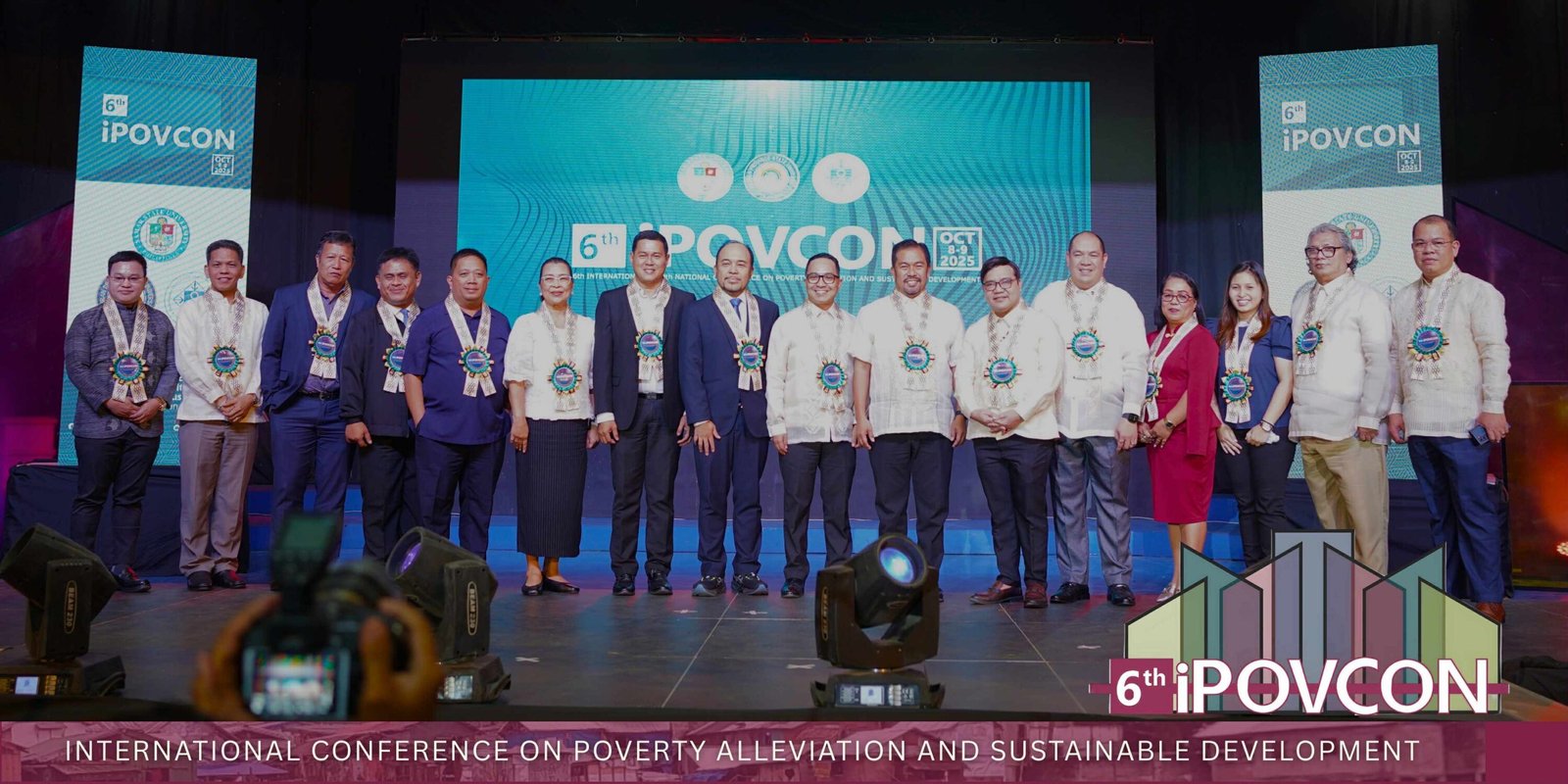NAVAL, BILIRAN, Philippines—“Technology-Driven Solutions for Poverty Alleviation and Sustainable Development” serves as the guiding mantra of this year’s Poverty Conference as a bold move to strategically maximize technology in the fight against poverty. With this call, Samar State University (SSU) has commenced the 6th International and 9th National Conference on Poverty Alleviation and Sustainable Development in partnership with Biliran Province State University (BiPSU) and the Department of Economy, Planning, and Development (DEPDev) – Region 8.
The two-day confab, being held at the BiPSU Gymnasium in Naval, Biliran, drew together 179 researchers and practitioners from across the globe, all united in exploring how technology can serve as a bridge out of poverty. Day 1 offered a series of compelling keynote and plenary addresses that laid the groundwork for evidence-based, technology-driven approaches to eradicating poverty.
Opening the keynote series, Director Meylene C. Rosales of DEPDev Region 8, who also serves as iPOVCON 2025’s co-host, set the tone with her address, Bridging Poverty with Tech: Governance, Jobs, Climate. She emphasized that effective poverty alleviation lies at the intersection of good governance, job creation, and climate resilience, and are all enabled by appropriate technologies. Rosales underscored the importance of effective governance systems, climate-adaptive innovations, and employment pathways that align with the country’s development plan.
“Technology alone does not solve poverty,” Director Rosales rather emphasized that technology must always serve the people, especially those in vulnerable communities.
Continuing the conversation, Dr. John Glenn D. Ocaña, Regional Director of the Department of Science and Technology (DOST) Region 8, delivered his keynote on Harnessing Science, Technology, and Innovation to Break the Cycle of Poverty. Dr. Ocaña emphasized that technological innovation should not remain confined to laboratories or policy papers, it must directly reach communities in need. Drawing from DOST’s regional initiatives, he highlighted how innovations in agriculture, disaster mitigation, and healthcare have improved the lives of people in rural areas.
Building on this, Dr. Antonius Torang P. Siahaan, Dean of the Faculty of Business at Sampoerna University, Indonesia, expanded the discussion to a global scale through his presentation, “Digital Financial Literacy and Technology as Catalysts for Global Economic Inclusion.” He discussed how financial technology, such as mobile banking and microcredit platforms, can empower marginalized populations, provided that users are equipped with adequate digital and financial literacy. Siahaan stressed that without education and inclusivity, digital progress risks widening the gap between the privileged and the poor, rather than closing it.
The focus then shifted toward national policy frameworks as Undersecretary Rosemarie G. Edillon of DEPDev’s Policy and Planning Group joined the confab virtually, and took the stage with her keynote, “Strategic Pathways to Inclusive Growth: Leveraging Digital Transformation for Poverty Reduction.” Usec. Edillon outlined actionable strategies to ensure that digital transformation extends its benefits to rural and underprivileged sectors. She emphasized policy coherence, inter-agency collaboration, and the integration of digital infrastructure in key areas such as education, health, and economic development to create a more equitable digital future.
Rounding off the keynote addresses, Dr. Maria Romina Gemini Brion Zabala, President and CEO of ACG Human Capital Solutions Corp., shared her insights on “Managing Complexity and Decision Making in Sustainable Innovation and Strategy.” During her interactive presentation, Dr. Zabala discussed the challenges of navigating technological innovation within complex socio-economic systems, emphasizing the importance of adaptive leadership, participatory decision-making, and data-driven strategies.
As the conference transitioned into the plenary sessions, discussions deepened around the practical applications of technology-driven initiatives. Assistant Secretary Napoleon K. Juanillo, Jr. of the DOST-Science and Technology Information Institute (STII), who joined virtually, opened the plenary with his talk, “Science, Technology, and Innovation as Engines of Inclusive Growth: Bridging R&D with Grassroots Impact.” He pointed out the persistent gap between research outputs and real-world implementation, calling for stronger partnerships among universities, local governments, and private sectors to translate research into livelihood-enhancing innovations at the community level.
Following this, Dr. Tirso A. Ronquillo, President of the Philippine Association of State Universities and Colleges (PASUC), highlighted the pivotal role of higher education institutions in driving community empowerment. In his plenary address, “Empowering Communities through University-Led Innovation: State Universities and Colleges as Catalysts for Tech-Driven Poverty Solutions,” Dr. Ronquillo presented inspiring examples of Batangas State University’s high-impact programs. His message reinforced that universities are not merely centers of learning but catalysts for social transformation.
Concluding the plenary series, Mayor Gretchen Stephanie M. Espina of the Municipality of Naval shared a local perspective through her presentation, “Innovative Governance and Sustainable Practices in the Municipality of Naval: A Model for Eco-Conscious Urban Development.” She detailed how Naval’s governance model integrates technology in public services, environmental management, and urban planning. Her initiatives, including eco-conscious tourism and digitalized service delivery, demonstrate how innovation and sustainability can coexist in local governance to uplift communities.
The day’s sessions culminated in a Commitment Signing Ceremony, where partners and participants pledged to sustain collaborative efforts and translate the day’s insights into action. Dr. Vivian L. Moya, Executive Director for Extension Services at SSU, then synthesized the key takeaways of the day. The day concluded with a networking session and exhibit showcase led by BiPSU.

